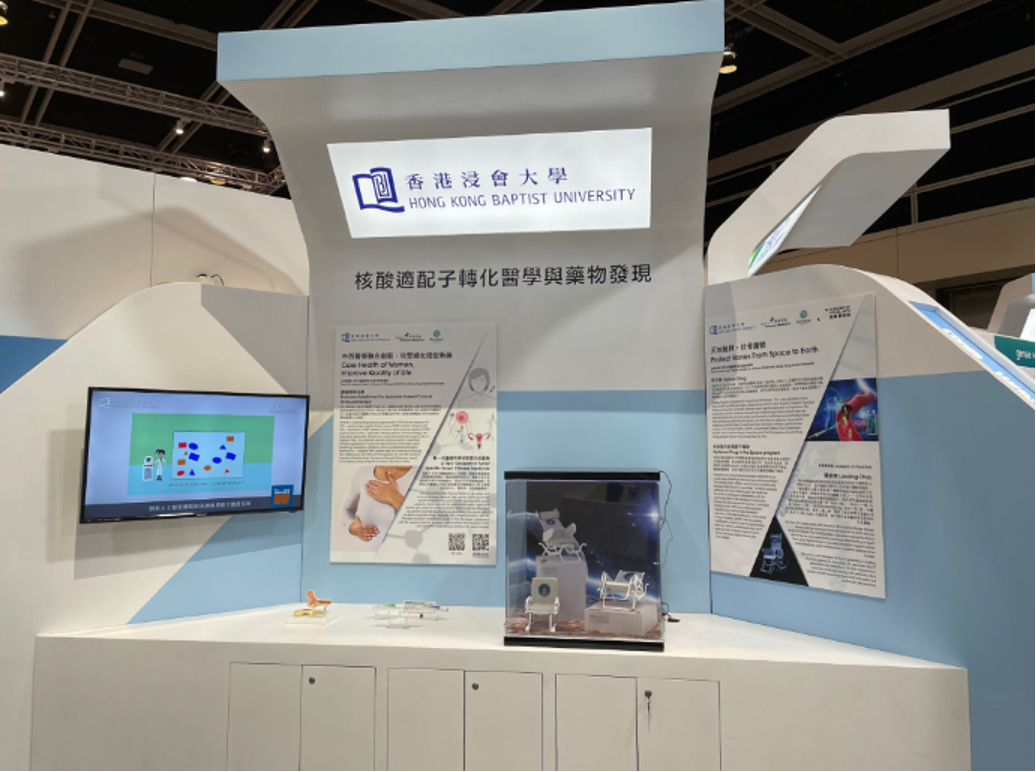Apc001 from the Law Sau Fai Institute for Advancing Translational Medicine in Bone & Joint Disease has been recognized as representative achievement in the field of medical and health sciences for the 25th anniversary of Hong Kong’s return to the Motherland
December 11, 2022
To celebrate the 25th anniversary of Hong Kong’s return to the Motherland, our Hong Kong Foundation specially formed an Assessment Panel composed of experienced scientists from various universities in Hong Kong to select 25 outstanding and representative scientific research projects among 50 nominated projects to be exhibited, including Apc001 product from the Law Sau Fai Institute for Advancing Translational Medicine in Bone & Joint Diseases (TMBJ) in Hong Kong Baptist University.

Aptamer Translational Medicine and Drug Discovery
Hong Kong Baptist University
Orphan Drug for Osteogenesis Imperfecta (OI): OI is a rare genetic bone disorder. We collaborated with Shanghai Sixth People's Hospital and identified sclerostin as a specific biomarker for OI patients. Marketed sclerostin antibodies have cardiovascular risks. Our aptamer drug Apc001, which promotes bone formation without cardiovascular risks, has been granted orphan drug designation by the FDA. This is the first aptamer drug in China to receive FDA orphan drug designation.
Aptamer Drug for Future Moon Landings: Bone loss induced by weightlessness and increased stiffness of the carotid artery are challenges faced by astronauts during long-term space travel. Building on our research findings from the Tianzhou-1 cargo spacecraft, we discovered that long-acting modified Apc001 can combat weightlessness-induced bone loss without increasing carotid artery stiffness, providing aptamer drugs for China's 2030 lunar exploration program.
Precision Medicine for Aptamer-based Cancer Immunotherapy: Anti-PD-L1 antibody Keytruda was approved by US FDA for the treatment of PD-L1-positive triple-negative breast cancer (TNBC) patients. However, the PD-L1 expression in TNBC patients is limited, which leaves a majority of TNBC patients with no PD-L1 expression still lacks effective immunotherapy. We have newly discovered sclerostin as a novel immunotherapy target in PD-L1-negative TNBC. Our screened sclerostin aptamer Apc001 could relief immune suppression in tumor microenvironment and inhibit tumor progression and metastasis, exhibiting clinical translational potential in treating PD-L1-negative TNBC patients with low response to Keytruda. Our collaboration with Aptacure Therapeutics Ltd. won the Top 50 of innovative Biotechnology Enterprises (Potential Enterprise Award) in Guangdong-Hong Kong-Macau Greater Bay Area in 2020.


Project Responsible Department and Leaders:
Professor LYU Aiping
Dean, School of Chinese Medicine, Hong Kong Baptist University
Professor ZHANG Ge
Associate Dean (Research), School of Chinese Medicine, Hong Kong Baptist University
Awards:
Orphan Drug Designation by the US Food and Drug Administration (FDA) in 2019.
Top 50 of innovative Biotechnology Enterprises (Potential Enterprise Award) in Guangdong-Hong Kong-Macau Greater Bay Area in 2020.



